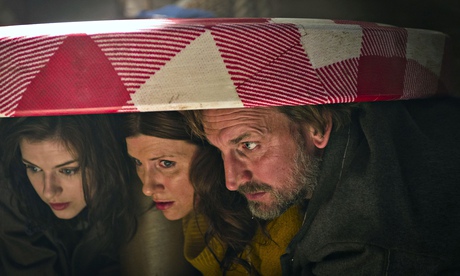
When I first read The Borrowers aged about seven, it barely seemed fiction, apart from trivial details like the main characters being slightly undersized and living under the floorboards beneath a long case clock.
In every other way the lives of the Clock family and the meticulous social distinctions the mother Homily struggled so hard to maintain – the Clocks clearly superior to the sunburnt outdoor Borrowers like Spiller, but uneasy about their precise status in relation to snooty families like the Harpsichords and the Overmantels – seemed perfectly familiar. I was born into a rented flat in a large house, in a once genteel suburb of Dublin where keeping up appearances was a daily struggle for many: there were still boot-scrapers to be used by boys delivering painfully tiny grocery orders, a butler who could be hired by the hour for luncheon parties, and striped cloth covers taken out annually at the first threat of sunlight to preserve wood grained front doors. Poor Homily didn’t have a front door, but if she had would certainly have run up a cover out of a borrowed scrap of antimacasser.
And there were clearly Borrowers in that house, almost visible through the broad gaps between the draughty uncarpeted floorboards. So many things disappeared forever – stamps, scissors, small pieces of jewellery, the broken-off silver handle of a butter knife, needles, all the keys to the inner doors which I guiltily remember gathering up one bored day though I could genuinely never recall what happened next.
If my arty, jeans-wearing mother was absolutely not Homily with her long apron and slipping hairpins, she had her own Homily anxieties about her background and upbringing. I was painfully aware of my own similarities to the book’s teenage hero Arrietty, avoiding household chores on all possible occasions by burying my head in a book, and my father was unmistakably Pod, Arrietty’s father. I’m not aware that he ever had to absail down the back of an armchair with the aid of some button thread and a bundle of shirt pins, but if some domestic disaster had required it, he would have been perfectly equipped for the task. He also conducted a long correspondence with an ancient and eccentric lady, by letter, so there was never any Fine Old Pale Madeira, but otherwise it was very like Pod’s relationship with Great Aunt Sophy.
My parents eventually bought the whole house at a bargain price and replaced Victorian gloom with red lino floor tiles and yellow formica kitchen units (later replaced again with as close to the originals as my remorseful mother could contrive) and I read the succession of books in which Mary Norton continued the story of the Borrowers. Arrietty’s adventurous spirit and Homily’s social aspirations combined disastrously to force the Clocks out into the terrifying fields and the angry glare of the sun, at one point into the appalling social humiliation of inhabiting an old laced boot. However none of the later books has quite the perfectly-realised charm of the original, first published in 1952, in a Britain where Arrietty’s yearning for colour, light, and greater excitement than jealously-preserved middle-class respectability, would have struck home for many readers.
When my father died, the hardest thing to get rid of was his collection of hoarded nails – some carefully straightened in a vice after they were pulled out of old planks - screws, tacks, bolts and washers, all stored in old Maxwell House coffee jars in the scullery cupboard. Nowhere in that minimally heated Victorian house was ever bone dry, so when I opened the lids the contents were red with rust, but obviously I could have simply have sat down at his workbench with a bale of sandpaper and over a period of years restored each one to almost as good as new. Pod, and, I fear, my father, would never have forgiven me for binning them.

